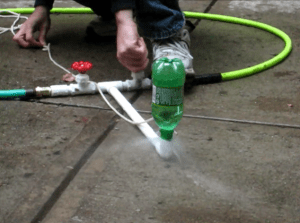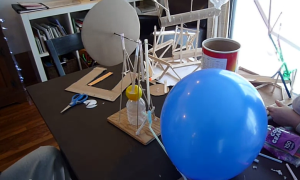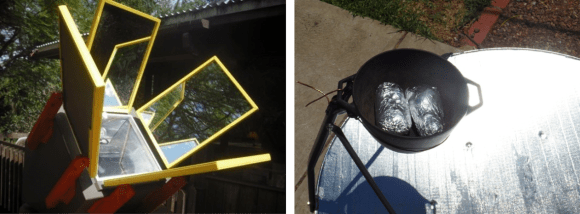
UPDATE: Listen to the segment here.
Did you know I’m going to be a guest on NPR Science Friday today? If this is the first you’re hearing about it you need to sign up for the mailing list (there’s a sign-up form in the right hand column of this page).
If you’ve already listened to the show and found your way here for the goods on the projects, don’t worry. We’ve got you covered. Join us after the break for project links and details.
The Living Nightlight
Bioluminescence is a fantastic subject for a Biology science project. The ability for a simple organism to produce light is very cool. But having a jar next to your bed full of the little creatures is even better. Check out [Caleb Kraft] in the video above to see how easy it is to maintain your own culture of Pyrocystis Fusiformis. A starter culture is inexpensive, easy to find, and non-toxic. You can experiment with exposure to different types of light during the day to achieve the best performance at night. And if you’re in it for the long haul you can keep the experiment going indefinitely. Learn more from the original project posting.
Water Bottle Rocket
 [Lou Wozniak] who is known by many as [How To Lou] put together this water bottle rocket project. He used a garden hose on one side and an air compressor on the other but also shows how you could use a bike pump instead. The launcher itself is made of PVC, which provides the learning experience of seeing how the two valves work before assembly, as well as the “magic” of chemically welding PVC which takes just a few seconds to form a permanent bond. There’s plenty of room for trial and error with different mixes of water and air pressure. The realm of aerodynamics will be fun to explore by testing different bottle shapes and adding fins or a nose cone to the rocket. Here’s our original feature of the project.
[Lou Wozniak] who is known by many as [How To Lou] put together this water bottle rocket project. He used a garden hose on one side and an air compressor on the other but also shows how you could use a bike pump instead. The launcher itself is made of PVC, which provides the learning experience of seeing how the two valves work before assembly, as well as the “magic” of chemically welding PVC which takes just a few seconds to form a permanent bond. There’s plenty of room for trial and error with different mixes of water and air pressure. The realm of aerodynamics will be fun to explore by testing different bottle shapes and adding fins or a nose cone to the rocket. Here’s our original feature of the project.
Steam Engine Model
 This is by far my favorite of all the possible science projects I’ve seen. It’s a model steam engine built by [Christian Hegenberger] for his second grade science project. His dad [Erich] tells us he talked him down from a much more difficult project.
This is by far my favorite of all the possible science projects I’ve seen. It’s a model steam engine built by [Christian Hegenberger] for his second grade science project. His dad [Erich] tells us he talked him down from a much more difficult project.
It might sound like a very difficult undertaking, but the project walk-through breaks down each part so that no prior engineering know-how is necessary. If you’ve used a hot glue gun we’re sure you’ll be able to combine the drinking straws, coat hanger, cardboard, plastic water bottle, and a couple of balloons to make your own working steam engine model. We don’t think you even need to involve the kids… this will be just as fun as a grown-up experiment. Here’s our original feature, but don’t miss the video of it in action below:
Cooking Hack Bonus!

We heard that [Ira] was going to be discussing summer cooking hacks in the same episode. Here’s a couple of memorable ones. To the left is a solar oven whose mirrors fold down for easy transport. On the right is a cooking implement made from a satellite TV dish. The parabolic reflector has been covered with foil tape. It focuses light on the cast iron pot which is where the original receiver horn was located. This provides more than enough heat to make a tasty baked potato.















WIth all your other posts, I feel that I should comment with the mockery you have. If your going to go through all the work to get on the radio, why not got the extra mile and go on tv?
Rad!
i remember a few years ago when i took some copper pipe with a Y + valves at one end and made a pressure washer with an air compressor + water hose. Totally awesome
i should do it again, but put i soap vacuum line on it :D
I just heard the intro from Ira Flato — your name wasn’t mentioned.
Tuned to the first hour, standing by. SciFry is the bomb. I have lost the Lakeshore but WVPE with it’s horrible compression is listenable. 90 miles distant.
Here is the schedule for today’s topics:
http://www.npr.org/templates/rundowns/rundown.php?prgId=61
– Volcano ‘Screams’ Before Eruption
– Capturing the Sounds of Biodiversity
– Eruptions on the Sun Set Off ‘Solar Tsunamis’
– Astronomers Spot Another Moon Around Neptune
– Fish Oil: Too Much of a Good Thing?
– DIY Summer Hacks, From the Pool to the Grill
They just finished the “Neptune Moon” topic, Newsbreak in progress…
BBC News “HOUR”? When will the “Summer Hacks” topic begin?
Patience, grasshopper… it’s the next segment, scheduled to start between :10 and :15 of this hour. :-)
and… we’re go at :20!!!
So that’s how you pronounce Mike’s last name…
Not here. No Sci-Fri on local NPR station after the Neptune Moon topic. Bummed…
Yes, they pronounced it perfectly… which is amazing. Perhaps the phonetic spelling will help: ‘Stish’
That’s what I was waiting for!
I always read it as Scuzzies. (SCSI’s?)
Now I know.
how about Scuzukis?
Im listening to the program of this right now!
Very awesome that you guys made it on there.
I have been listening continuously. My local station played the full BBC news hour. Now it is US news about Obama’s option on “Stand Your Ground”. No more Science Friday after the “Neptune Moon” topic… Bummer. Apparently, local stations only play a portion. Other times I listened, it was only an hour long too, as I recall…
Very disappointed.
The podcast is now available. I put the link at the top of the post.
Regarding the Bottle Water Rocket, beware that this build does not contain a backflow preventer check-valve to prevent air pressure from pushing contaminated water from the water hose back into the household drinking water supply. Many newer homes may already have such a backflow preventer on the outside water tap, but older homes do not have this. It may actually be illegal in some jurisdictions to connect pressurized air to the same plumbing system as drinking water without a backflow preventer check-valve, or at least a permit or code variance.
Hopefully, your hose has not been stored while wet inside (to prevent bacterial colony, mold, or mildew growth inside the hose). This device should really have a check-valve on the water supply side, to assure safety for the drinking water supply (especially if any vulnerable individuals rely on that water supply).
Thanks.
Backflow preventer ($6.91):
http://www.rakuten.com/prod/back-flow-preventer/219993462.html
Very inexpensive safety device, available at most local hardware stores.